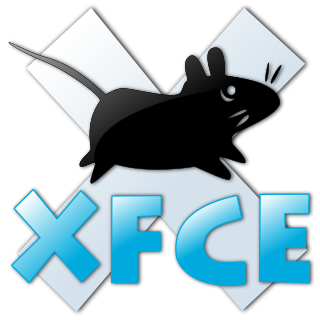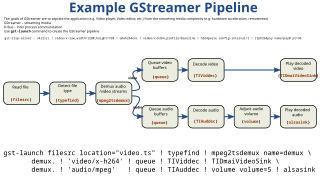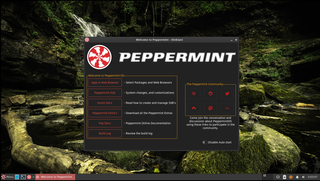
A Linux distribution is an operating system made from a software collection that includes the Linux kernel and often a package management system. Linux users usually obtain their operating system by downloading one of the Linux distributions, which are available for a wide variety of systems ranging from embedded devices and personal computers to powerful supercomputers.

Xfce or XFCE is a free and open-source desktop environment for Linux and other Unix-like operating systems.

GNOME Evolution is the official personal information manager for GNOME. It has been an official part of GNOME since Evolution 2.0 was included with the GNOME 2.8 release in September 2004. It combines e-mail, address book, calendar, task list and note-taking features. Its user interface and functionality is similar to Microsoft Outlook. Evolution is free software licensed under the terms of the GNU Lesser General Public License (LGPL).

gedit is a text editor designed for the GNOME desktop environment. It was GNOME's default text editor and part of the GNOME Core Applications until GNOME version 42 in March 2022, which changed the default text editor to GNOME Text Editor. Designed as a general-purpose text editor, gedit emphasizes simplicity and ease of use, with a clean and simple GUI, according to the philosophy of the GNOME project. It includes tools for editing source code and structured text such as markup languages.

GStreamer is a pipeline-based multimedia framework that links together a wide variety of media processing systems to complete complex workflows. For instance, GStreamer can be used to build a system that reads files in one format, processes them, and exports them in another. The formats and processes can be changed in a plug and play fashion.

Rhythmbox is a free and open-source audio player software, tag editor and music organizer for digital audio files on Linux and Unix-like systems.
The following comparison of video players compares general and technical information for notable software media player programs.

Compiz is a compositing window manager for the X Window System, using 3D graphics hardware to create fast compositing desktop effects for window management. Effects, such as a minimization animation or a cube workspace, are implemented as loadable plugins. Because it conforms to the ICCCM conventions, Compiz can be used as a substitute for the default Mutter or Metacity, when using GNOME Panel, or KWin in KDE Plasma Workspaces. Internally Compiz uses the OpenGL library as the interface to the graphics hardware.

Pitivi is a free and open-source non-linear video editor for Linux, developed by various contributors from free software community and the GNOME project, with support also available from Collabora. Pitivi is designed to be the default video editing software for the GNOME desktop environment. It is licensed under the terms of the GNU Lesser General Public License.

Moblin, short for 'mobile Linux', is a discontinued open source operating system and application stack for Mobile Internet Devices (MIDs), netbooks, nettops and embedded devices.

Buzztrax is a free software project designed to create a clone of the Buzz music composer. Its functionality is to preserve the playability of the compositions made with Buzz. Songs are made by adding virtual sound generators and effects, connecting them, recording short musical phrases and arranging them in the sequencer. For distribution, songs can be exported to common audio formats such as OGG, MP3, WAV and many others.
The following comparison of audio players compares general and technical information for a number of software media player programs. For the purpose of this comparison, "audio players" are defined as any media player explicitly designed to play audio files, with limited or no support for video playback. Multi-media players designed for video playback, which can also play music, are included under comparison of video player software.
OggConvert is a free and open-source transcoder for digital audio and video files of various types into the free Ogg Vorbis audio format, and the Theora, VP8 and Dirac video formats. It supports Ogg, Matroska and WebM containers for output. It is developed by a single author, primarily for Linux. A number of community translations exist for the software.

Peppermint OS is a Linux distribution based on Debian and Devuan Stable, and formerly based on Ubuntu. It uses the Xfce desktop environment. It aims to provide a familiar environment for newcomers to Linux, which requires relatively low hardware resources to run.

Unity is a graphical shell for the GNOME desktop environment originally developed by Canonical Ltd. for its Ubuntu operating system. It debuted in 2010 in the netbook edition of Ubuntu 10.10. Since 2017, its development was taken over by the Unity7 Maintainers (Unity7) and UBports.

Zim is a graphical text editor designed to maintain a collection of locally stored wiki-pages, a personal wiki. It works as a personal knowledge base and note-taking software application that operates on text files using markdown. Each wiki-page can contain things like text with simple formatting, links to other pages, attachments, and images. Additional plugins, such as an equation editor and spell-checker, are also available. The wiki-pages are stored in a folder structure in plain text files with wiki formatting. Zim can be used with the Getting Things Done method.

DeaDBeeF is an audio player software available for Windows, Linux and other Unix-like operating systems. An ad-supported Android version is available, but has not been updated since 2017. DeaDBeeF is free and open-source software, except on Android.
The Sayonara Player is an audio software player for Linux and BSD.














